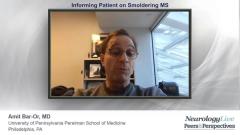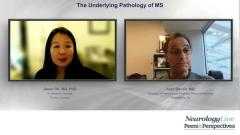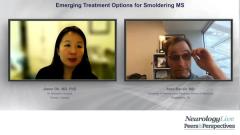
Informing Patient on Smouldering MS
Experts offer their experience on educating patients about smouldering multiple sclerosis (MS).
Episodes in this series

Transcript
Jiwon Oh, MD, PhD: So, can I ask Amit, just one last clinical question. Do you talk to your patients about smoldering MS? I was talking about earlier how, you know, this is really the hot topic and everybody at clinical and scientific meetings are talking about it, but is this a term that you use with patients and if you do, how do you describe it?
Amit Bar-Or, MD: Yeah, that's an excellent question because I think that it's important to broach, but it's also important to think of when is the right time for which patient. People living with MS and those around the time of diagnosis will often ask what kind of MS do I have? And they're very fearful that they don't have relapsing MS, that they have progressiveness, whether primary or secondary progressive, because historically they've associated the concept of progression with getting worse and having increasing disability over time. And the smoldering term is not exactly the progressive term, but in fact, it's trying to capture essentially the same concept with some more of a biological leaning, if you like. I do think that as we've gotten better and better at treating relapse biology, it's important to provide people, and I do this early on, with expectations that we ought to be able to do a terrific job at limiting relapse-related worsening, because of course not all relapses get fully better and people can get worse and worse and accumulate disability, have progression of their disability because of relapse-associated worsening, or RAS, as people have called it, but to let people know that there may be some worsening over time, more of a slow, gradual worsening that may reflect this nonrelapse biology and should not be interpreted as "my treatment that I'm on is not working." That's an important issue and I think that we need to deal with it more and more frequently as people have been touting high-efficacy therapies that are meant to have a major impact on the MS process, yet people clearly even on these treatments may experience and will over time experience some small during worsening. So I tend to speak with people even early on about these 2 different processes and the one that sort of seems to predominate early on, the relapse biology, we're really getting extremely good and should do our best to make sure that every person living with MS has no further injury from relapse biology by figuring out which treatment works best for them and that we are on the cusp, we hope, of having treatments that will be more effective against the more smoldering MS and I think that one of the reasons to have been reluctant to broach this earlier is the lack of treatments and the lack of a sort of treatment class on the horizon, but we are now at a point where we're beginning to see, in advanced phase studies, a class of therapy that I think, and certainly hope, as others do, will be able to impact the smoldering disease process and certainly this is a time to enter the discussions and it's important, I think, for people to have realistic, optimistic, but realistic expectations.
Jiwon Oh, MD, PhD: I find the term smoldering is something that seems to resonate with patients a lot and I think, as you said earlier, it's a term that the field has landed on because I think the attempt was to try to reflect some of the underlying chronic inflammation that is driving, we think, in part, smoldering MS, but when you talk to patients about what smoldering MS is and they're the ones that have noticed this, you know, slow grumbling, worsening, that's subtle, but there, and that they can see it over a number of years. It seems to be, you know, it's something that causes a lot of head nodding in my patients because I think it's something that kind of reflects what they are experiencing on a day-to-day basis or year-to-year basis, I should say.
Transcript is AI-generated and edited for clarity and readability.
Newsletter
Keep your finger on the pulse of neurology—subscribe to NeurologyLive for expert interviews, new data, and breakthrough treatment updates.













